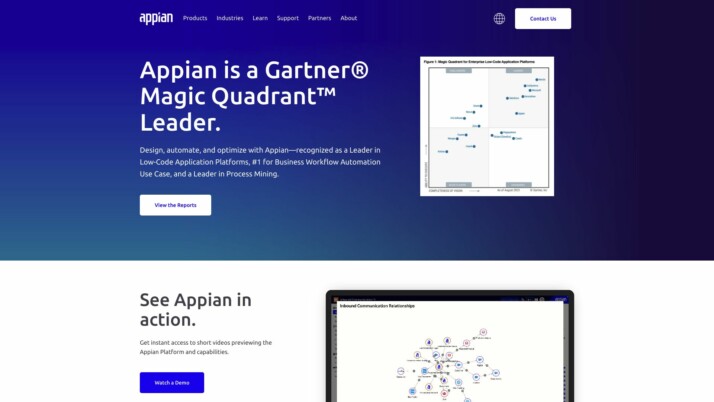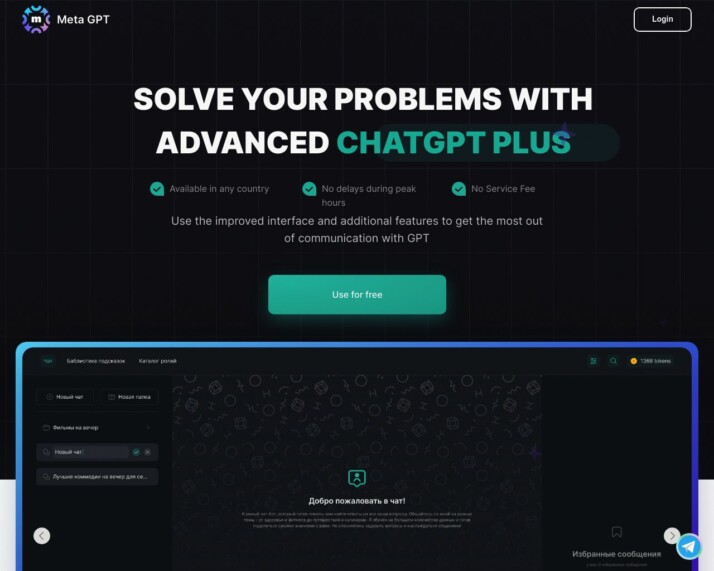Appian vs. MetaGPT: Comparing AI Development Platforms
AI technology reshapes industries and redefines possibilities, driving demand for powerful yet accessible solutions. This comparison explores Appian’s low-code AI integration platform and MetaGPT’s innovative multi-agent collaboration framework. We’ll examine their unique approaches, strengths, and limitations in AI development and deployment.
By analyzing key features, use cases, and overall utility, we aim to help developers, business leaders, and AI enthusiasts make informed decisions about these tools. We’ll also introduce SmythOS, a comprehensive alternative that addresses gaps in both platforms, offering advanced capabilities for creating and deploying AI agents across various environments.
Appian Overview
Appian empowers businesses to harness artificial intelligence through its versatile low-code platform. The software integrates AI capabilities into existing workflows, enabling organizations to automate processes and enhance decision-making without extensive coding expertise.


Appian’s AI tools cater to a wide range of industries, from finance to healthcare. The platform excels in document processing, email classification, and data extraction tasks. Its low-code design environment allows both technical and non-technical users to create custom AI models quickly, democratizing AI development across organizations.
Appian’s AI tools cater to a wide range of industries… Its low-code design environment allows both technical and non-technical users to create custom AI models quickly, democratizing AI development across organizations.
Key features of Appian include built-in AI capabilities, seamless integration with external AI services, and robust security measures to ensure data privacy. The platform supports both development and production environments, enabling smooth transitions from testing to deployment. Appian’s visual builders and no-code options facilitate rapid AI model creation and management.
While Appian offers powerful AI integration, it lacks some advanced features found in specialized AI platforms. The software doesn’t explicitly support autonomous agent collaboration or provide built-in debugging tools for AI models. Additionally, Appian’s focus on business process automation may limit its appeal for users seeking pure AI research and development capabilities.
Appian integrates well with existing enterprise systems and supports various APIs, enhancing its utility in complex IT ecosystems. The platform’s scalability and emphasis on data privacy make it suitable for large-scale deployments in regulated industries. However, users should consider their specific AI needs and evaluate whether Appian’s business-oriented approach aligns with their goals.
MetaGPT Overview
MetaGPT revolutionizes multi-agent collaboration in AI development. This open-source framework combines human Standardized Operating Procedures (SOPs) with advanced Large Language Models (LLMs) to simulate a software company’s structure and workflow.


MetaGPT assigns distinct roles to AI agents, mirroring a traditional software development team. Product managers, architects, engineers, and testers work in concert, tackling complex tasks with improved consistency and reliability. The platform’s core philosophy, “Code = SOP(Team),” integrates established human practices into AI-driven processes, significantly reducing errors common in multi-agent systems.
MetaGPT assigns distinct roles to AI agents, mirroring a traditional software development team… tackling complex tasks with improved consistency and reliability.
The framework’s unique assembly line paradigm breaks down tasks into manageable subtasks, each handled by specialized agents. This approach ensures accurate and robust solutions while generating comprehensive documentation throughout the development process. MetaGPT produces requirement documents, design artifacts, flowcharts, and interface specifications, enhancing the final code’s success rate and facilitating better human-AI interaction.
MetaGPT’s strength lies in its ability to handle complex software development tasks, producing coherent and high-quality code. However, it lacks some features found in more comprehensive AI platforms. The framework doesn’t offer built-in memory and context capabilities for agents, multimodal interactions, or a dedicated debug mode. It also doesn’t provide specific tools for human-AI interaction beyond the development process.
Despite these limitations, MetaGPT’s innovative approach to AI collaboration sets a new standard in the field. By leveraging human-like SOPs and structured communication protocols, it expands the capabilities of AI agents, enabling them to tackle diverse and complex tasks across various domains. For developers and organizations seeking to enhance their AI-driven software development processes, MetaGPT offers a unique and powerful solution.
Feature Comparison
Appian and MetaGPT offer distinct approaches to AI development and deployment. Appian provides a low-code platform for integrating AI into business processes, while MetaGPT focuses on simulating software development teams using AI agents.
Appian excels in enterprise-ready features like robust security, scalability, and integration with existing systems. It offers built-in AI capabilities for document processing, email classification, and data extraction. However, Appian lacks advanced AI collaboration features and debugging tools specifically for AI models.
MetaGPT shines in multi-agent collaboration, mimicking human software development teams. It generates comprehensive documentation and code for complex projects. However, MetaGPT doesn’t provide hosted environments or visual builders, limiting its accessibility for non-technical users.
Neither platform offers strong support for autonomous agents, multimodal interactions, or advanced debugging capabilities. SmythOS addresses these gaps with features like hosted agents, visual builders, autonomous agent support, and powerful debugging tools, making it a more comprehensive solution for AI development and deployment across various use cases.
Feature Comparison Table
| Appian | MetaGPT | SmythOS | |
|---|---|---|---|
| CORE FEATURES | |||
| Hosted Agents (Dev, Production) | ❌ | ✅ | ✅ |
| Visual Builder | ✅ | ❌ | ✅ |
| No-Code Options | ✅ | ❌ | ✅ |
| Autonomous Agents | ❌ | ✅ | ✅ |
| Multi-Agent Collaboration | ❌ | ✅ | ✅ |
| Agent Work Scheduler | ❌ | ✅ | ✅ |
| SECURITY | |||
| IP Control | ✅ | ❌ | ✅ |
| COMPONENTS | |||
| Foundation AIs | ❌ | ✅ | ✅ |
| Huggingface AIs | ❌ | ✅ | ✅ |
| Zapier APIs | ❌ | ✅ | ✅ |
| Data Lakes | ✅ | ❌ | ✅ |
| DEPLOYMENT OPTIONS (EMBODIMENTS) | |||
| Staging Domains | ✅ | ❌ | ✅ |
| Deploy as Site Chat | ❌ | ✅ | ✅ |
| Deploy as Scheduled Agent | ❌ | ✅ | ✅ |
| Deploy as GPT | ❌ | ✅ | ✅ |
| DATA LAKE SUPPORT | |||
| Hosted Vector Database | ❌ | ❌ | ✅ |
| Sitemap Crawler | ❌ | ❌ | ✅ |
| YouTube Transcript Crawler | ❌ | ❌ | ✅ |
| URL Crawler | ❌ | ✅ | ✅ |
Best Alternative to Appian and MetaGPT
SmythOS stands out as the superior alternative to Appian and MetaGPT, offering a comprehensive platform for AI agent development and deployment. Our solution combines the best of both worlds: the enterprise-ready features of Appian and the innovative multi-agent collaboration of MetaGPT, while addressing their limitations.
We provide a visual builder with drag-and-drop functionality, making AI development accessible to both technical and non-technical users. This approach democratizes AI creation, allowing businesses to rapidly prototype and deploy AI solutions without extensive coding knowledge. Our platform supports a wide range of AI models and integrations, ensuring flexibility and customization for diverse use cases.
SmythOS stands out as the superior alternative to Appian and MetaGPT, offering a comprehensive platform for AI agent development and deployment.
Unlike Appian and MetaGPT, SmythOS excels in autonomous agent capabilities. Our agents can operate independently, making decisions and performing tasks with minimal human intervention. This feature significantly enhances efficiency and scalability, allowing businesses to automate complex workflows and processes across various departments.
SmythOS also offers unparalleled debugging and monitoring tools, addressing a critical gap in both Appian and MetaGPT. Our platform provides real-time visibility into agent activities, comprehensive logs, and advanced debugging features. These tools ensure reliability and control, enabling users to fine-tune their AI agents for optimal performance.
Furthermore, SmythOS supports multimodal interactions and advanced deployment options, features lacking in both Appian and MetaGPT. Our platform allows AI agents to handle various data types, including text, images, and voice, expanding their utility across different applications. With flexible deployment options such as APIs, webhooks, scheduled agents, and chatbots, SmythOS ensures seamless integration into existing systems and workflows, making it the ideal choice for businesses seeking a versatile and powerful AI solution.
Conclusion
Appian and MetaGPT offer distinct approaches to AI development, each with unique strengths. Appian excels in enterprise-ready features and low-code AI integration, while MetaGPT shines in simulating software development teams using AI agents. However, both platforms have limitations in advanced AI collaboration, debugging tools, and support for autonomous agents.
SmythOS emerges as a superior alternative, addressing the gaps left by Appian and MetaGPT. With its intuitive drag-and-drop interface, extensive integration ecosystem, and support for multi-agent orchestration, SmythOS provides a more comprehensive solution for AI development and deployment. The platform’s versatility enables users to create and deploy AI agents across various environments, from APIs to chatbots, without extensive coding knowledge.
Unlike its competitors, SmythOS offers powerful features such as visual builders, autonomous agent support, and advanced debugging tools. These capabilities, combined with its ability to handle multimodal interactions and provide robust memory and context management, make SmythOS an ideal choice for businesses seeking to leverage AI effectively.
For those ready to explore the future of AI development and deployment, SmythOS offers a risk-free starting point. With a generous free plan and a 30-day money-back guarantee, users can create unlimited AI agents and experience the platform’s full potential. To see how SmythOS can transform your workflow, explore our diverse range of AI-powered agent templates and discover our extensive integration ecosystem. Take the first step towards revolutionizing your AI capabilities with SmythOS today.
Last updated:
Disclaimer: The information presented in this article is for general informational purposes only and is provided as is. While we strive to keep the content up-to-date and accurate, we make no representations or warranties of any kind, express or implied, about the completeness, accuracy, reliability, suitability, or availability of the information contained in this article.
Any reliance you place on such information is strictly at your own risk. We reserve the right to make additions, deletions, or modifications to the contents of this article at any time without prior notice.
In no event will we be liable for any loss or damage including without limitation, indirect or consequential loss or damage, or any loss or damage whatsoever arising from loss of data, profits, or any other loss not specified herein arising out of, or in connection with, the use of this article.
Despite our best efforts, this article may contain oversights, errors, or omissions. If you notice any inaccuracies or have concerns about the content, please report them through our content feedback form. Your input helps us maintain the quality and reliability of our information.
